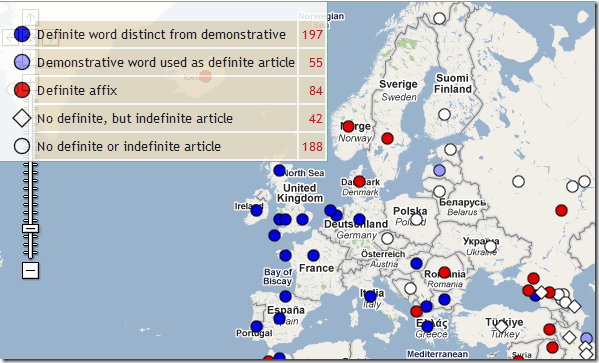I generally appreciate Daniel Wallace’s Grammar. Granted, I think he uses way too many categories that have very little to do with actual Greek grammar and everything to do with “literal” translation, but all in all, he provides quite a bit of information in an accessible manner.
His section on the Greek article is fantastic. And it should be considering that he wrote his dissertation on this particular part-of-speech. And yet, in spite of that, I cannot, for the life of me, understand the reasoning behind this following statement. It drives me crazy every time I see it.
One of the greatest gifts bequeathed by the Greeks to Western civilization was the article. European intellectual life was profoundly impacted by this gift of clarity.
Daniel B. Wallace, Greek Grammar Beyond the Basics: An Exegetical Syntax of the New Testament (Grand Rapids, Mich.: Zondervan, 1996), 207.
I should say that Wallace provides a footnote to this statement:
See P. Chantraine, “Le grec et la structure les langues modernes de l’occident,” Travaux du cercle linguistique de Copenhague 11 (1957) 20-21.
And it’s a reference to an article that I neither have access to nor could even read. But even still, I cannot accept it. Perhaps Latin didn’t have an article—definite or otherwise—the way that Greek does. Yet that does not mean that the Greek article is remotely related to the article we find in the either the Romance languages (e.g. Spanish, Italian, French…) or the Germanic Languages (English, German, Dutch, Norwegian…). If anything, the articles in Germanic languages are derived from Germanic demonstratives derived from Proto Indo-European.
And this is exactly what the OED says about English. It gives no indication that Greek is the origin, though it does cite Greek’s forms, but it also cites Latin and Sanskrit. The English article is derived from the Old English demonstrative. OED Online (which doesn’t appear to use unicode):
the, dem. a. (def. article) and pron.
[The reduced and flexionless stem of the OE. demonstrative se, séo (later
e,
éo),
æt, the neuter sing. of which has come down as the dem. pron. and adj. THAT. Com. Teut. and Indo-Eur.: = OFris. thi, thiu, thet, OS. (se), th(i)e, thiu (the), that (the), (MLG., MDu. de (die), dat, LG., Du. de, dat), OHG. der (de), diu, daz (mod.Ger. der, die, das), ON. sá, sú,
at, Goth. sa, sô,
ata, also Gr.
,
,
, Zend ho, h
, tat, Skr. sa, s
, tat; all the inflexional parts exc. the nom. sing. m. and f. having the stem
a-, Lith., Slav. to-, Gr.
-, Zend, Skr. ta-, Indo-Eur. to-, found also in L. in tam, tum, tunc, is-te, is-tud, etc. The nom. sing. m. and f. in OTeut., as in Skr., Zend, Gr., belong to another demonst. stem sa-, I.-Eur. so-, found also in Ir., Gael., Gaulish so this, L. -se in ip-se. But in OHG., OS. (in most dialects), and in late OE. (10th c. in Northumbrian, and at length everywhere) the s- forms were superseded by forms in
– (OHG. d-), from the same stem as the neuter
æt and the oblique cases, as well as the pl.
á, later
, THO. After the middle of the 13th c. the s- forms are no longer found, exc. as a belated survival (ze m., zy f.) in the Kentish dial. of the Ayenbite (1340). The only surviving reprs. of the OE. forms are the and that, Du. and LG. de, dat; but while LG. dat (besides its other uses) is still the neuter article, the Eng. that has ceased to be any part of the article.
Not to mention that fact that Greek, Romance, and Germanic languages are different branches of the Indo-European Family (<—very cool website).
More importantly, there’s another issue here. Even if the article of every Modern IE language was derived from Greek, there would still be no basis for Wallace’s statement.
Why? Well, the main reason is this:
Wallace’s statement would appear to suggest that without the article, we would all really struggle to talk about anything definite. We wouldn’t be able to talk about people, places, things, or events as specific or identifiable (the two proto-typical features of definiteness, though the Greek article only expresses the latter, I would argue). And as a result our Western Civilization would suffer. But this is plainly not the case. There are plenty of languages all over the world (and in Europe, I might add) that do not have any sort of article at all and get by just fine. 
The Map above shows languages and the status of the definite article as a part-of-speech. Its borrowed from WALS Online (specific map HERE). Of 566 languages represented in the WALS database, 188 of them have no sort of article at all. Fundamentally, there is no reason why a language that lacks any kind of article should have any influence on a language’s ability to express such “subtle” semantics as definiteness.
Again, I should emphasize that I use and appreciate Wallace’s grammar. It simply shouldn’t contain statements like this particular. Sentences like this detract from its quality, damage its reputation, and mislead students who are easily impressed by extravagant statements. They move us into the realm of “Greek is the most graceful and perfect of languages with the most beautiful organization…blah…blah…blah.” No, we don’t need any more that.